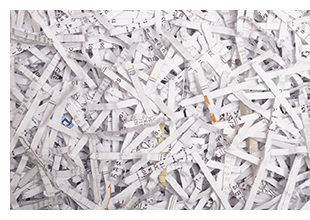|
Issue FAQ — Should I Shred It?  How do you interpret the word “destroy” on your department’s records retention schedule, particularly when you are dealing with paper records? Does “destroy” mean to put them in an Iron Mountain shredding bin or to throw them in the trash / recycling?
How do you interpret the word “destroy” on your department’s records retention schedule, particularly when you are dealing with paper records? Does “destroy” mean to put them in an Iron Mountain shredding bin or to throw them in the trash / recycling?To decide, ask yourself a few questions about the records. Most importantly, do they contain personally identifiable information (PII) about students, faculty, staff or others with whom the University does business? [PII is information that directly identifies someone (name, social security number, BGSU ID number, email address) or that indirectly makes it possible to infer who the individual(s) involved are (such as a combination of gender, major, office where they work, race, birth date, and other descriptors)]. If the records contain PII, they must be shredded. In addition, BGSU Policy 3341-6-18 — Data Use and Protection — identifies three categories that can be assigned to BGSU records: Public, Limited Access, and Restricted. [To review the policy and the definition of each category, follow this link: https://www.bgsu.edu/content/dam/BGSU/general-counsel/documents/Data-Use-and-Protection.pdf. To see the Data Resource Summary referred to in the policy and specific examples of what types of records fall into each category, follow this link: http://www.bgsu.edu/content/dam/BGSU/ITS/documents/it-policies/data-resource-summary.pdf]. As you’ll see in the Data Resource Summary, only “public” records can be disposed of in the trash/recycling. Limited access and restricted records must be confidentially destroyed. So which choice do you make? It’s best to simply get in the habit of shredding records that are eligible for destruction. This practice eliminates the need to carefully check each page of the records being destroyed, and avoids the risk of accidentally missing a page with PII and inadvertently throwing it in the trash. In general, a trash can or recycling bin should only be used to destroy records that had a wide and open distribution at the time of their creation, such as publications, public reports, etc. Have a question or topic you’d like to see addressed as an Issue FAQ? Please send it to csauer@bgsu.edu.  Please Take the Records Management Survey
Please Take the Records Management SurveyI’d like your input on some things — like how records are managed in your departments and what records management topics you’d like training on. To do this, I’ve created a 12 question survey to help me see where departments stand in terms of managing their paper and electronic records. The survey takes about 5-10 minutes to complete. You can access it at this link: https://bgsu.az1.qualtrics.com/jfe/form/SV_2tcfwF7ZTIO3EOh With the results of this survey I’ll be able to prepare upcoming training classes and have a better sense of what services are needed. I’ll also be better able to address your most pressing records management needs in this newsletter. Thank you for taking the time to participate. Speaking of Publications...  As you read in the FAQ section, items such as publications are intended to be widely and openly distributed. Because of that, historical researchers often find they provide some of the most “bang for the buck” in terms of informational value. Want to learn about the activities of an office or department — check out their annual report or quarterly newsletters. Want to learn more about student life — check out the many brochures and publications targeted towards students such as those about housing options, student organizations, and student handbooks to name just a few.
As you read in the FAQ section, items such as publications are intended to be widely and openly distributed. Because of that, historical researchers often find they provide some of the most “bang for the buck” in terms of informational value. Want to learn about the activities of an office or department — check out their annual report or quarterly newsletters. Want to learn more about student life — check out the many brochures and publications targeted towards students such as those about housing options, student organizations, and student handbooks to name just a few.So what does that have to do with you? Well, the primary way brochures, newsletters, pamphlets, and annual/quarterly reports get to the University Archives is by having them submitted by the offices that create them. In fact the General Retention Schedule for the University [available at this link: http://www.bgsu.edu/content/dam/BGSU/libraries/documents/cac/GS-Current.pdf] identifies annual reports, advertising materials, and other publications as items that should be regularly sent to the University Archives. So gather up those reports and publications and send them on over to the Library to my attention. We’ll make sure they’re made available to researchers. What if these reports and publications are only in electronic form? No problem! Some offices have already submitted their electronic materials to the Archives. Just contact me and we can discuss the transfer process. Thank you for helping make sure BGSU’s history is preserved. Why Records Management?  Do you ever wonder why it’s so important to pay any attention to your record? The Federal Aviation Administration has put together a list of 10 reasons why organizations need records management programs to “manage organization information so that it is timely, accurate, complete, cost-effective, accessible and useable.” These reasons include improving productivity, reducing litigation risks, and preserving organizational memory. To read the full list go to: https://www.faa.gov/about/initiatives/records/what/why_records_management/
Do you ever wonder why it’s so important to pay any attention to your record? The Federal Aviation Administration has put together a list of 10 reasons why organizations need records management programs to “manage organization information so that it is timely, accurate, complete, cost-effective, accessible and useable.” These reasons include improving productivity, reducing litigation risks, and preserving organizational memory. To read the full list go to: https://www.faa.gov/about/initiatives/records/what/why_records_management/
For the Record is the newsletter of the Bowling Green State University Records Management program. It is distributed electronically to records center users and others responsible for the records of their office. All content is written by Cindy Sauer unless otherwise indicated. To be added to or removed from the distribution list for For the Record please contact Cindy Sauer at csauer@bgsu.edu.
|
|


